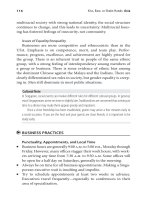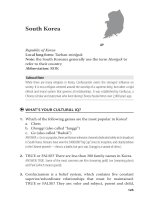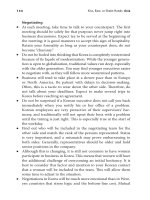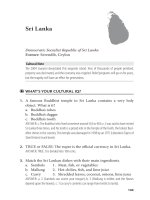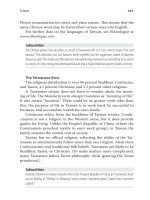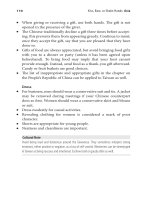Tài liệu How to Do Business in 12 Asian Countries 12 pptx
Bạn đang xem bản rút gọn của tài liệu. Xem và tải ngay bản đầy đủ của tài liệu tại đây (103.65 KB, 9 trang )
80 Kiss, Bow, or Shake Hands: Asia
Malaysians obviously feel comfortable with their own cultural
traditions and will defend them.
■
*
Know Before You Go
Malaysia is close to the epicenter of the tsunami of 2004, but it was shielded from full
impact by the island of Sumatra in Indonesia. Besides the tragedy of the earthquakes and
tsunamis, the greatest hazards faced by the average foreign traveler are those found in
most countries near the equator: sunburn, heat stroke, and/or digestive upsets. Frighten-
ing incidents reported in the global news that also occur, but are relatively rare, include:
mob violence, typhoons, and floods.
Malaysia maintains some of the strictest censorship laws in the world. It is official
policy to insulate the Malaysian population from the “corrupting” foreign media. Foreign
journalists are routinely asked to leave the country after writing something uncompli-
mentary about Malaysia.
Although Malaysia has virtually no Jewish population, anti-Semitism is common,
especially among Muslims. Even former Prime Minister Mahathir Mohamad publicly
blamed Jews for his country’s financial problems.
Bribery and corruption are not unknown in Malaysia. Historically, Malaysia has been
considered less corrupt than Indonesia but more corrupt than Singapore (which enforces
strict antibribery laws).
●
3
CULTURAL ORIENTATION
Cognitive Styles: How Ethnic Malays Organize
and Process Information
Although the ethnic Malays have assimilated many indigenous
religious rituals into their Islamic religion, they adhere to the closed
thinking of Islam when it comes to accepting outside information
into their everyday lives. Information is processed subjectively and
associatively, and this leads to personal involvement in problems
rather than abstract analysis.
Negotiation Strategies: What Ethnic Malays Accept as Evidence
e subjective feelings of the moment form the basis for truth,
with faith in the ideologies of Islam having a very strong inuence.
Only the most westernized and secular of ethnic Malays will use
objective facts as the sole source of the truth.
Value Systems: The Basis for Behavior
Much of the business in Malaysia is conducted by the Chinese
and Indians, who have a very dierent system of values from the eth-
nic Malays. e following three sections identify the Value Systems
in the predominant culture—their methods of dividing right from
wrong, good from evil, and so forth.
Locus of Decision-Making
e individual ethnic Malay makes decisions based upon the
immediate situation and the relationships among those involved.
e highly religious may refer to Islamic guidebooks which detail the
proper way to handle every decision in life.
Ethnic Malays are quick to organize and have the support of the
group behind their decisions. ey are not good at confrontations
and try to communicate in such a way as to alleviate conict. ey
seldom use a categorical “no.” It is important for foreign business
executives to develop a personal relationship with their Malaysian
counterparts.
Sources of Anxiety Reduction
Solid religious beliefs among ethnic Malays give structure and
stability to life. e norm is a nuclear household with strong ties to
both the husband’s and wife’s extended families. e extended family
is expected to help in time of need. ere is little friction between
common law and Islamic law, as they are oen combined into a single
pronouncement. Respect for authority, unbreakable family ties, and
the performance of proper social behavior provide strength in times
of stress.
Issues of Equality/Inequality
Most states have sultans, and the division between royalty and
commoners is rarely bridged. Royalty is treated with great deference,
Malaysia 81
82 Kiss, Bow, or Shake Hands: Asia
which includes elaborate ritual and special terms of address. e eth-
nic Malays hold the political power, but they and the economically
dominant Chinese continually joust with each other. Ethnocentrism
and stereotypes abound, but virulent racism is stied. Malaysians
practice the strong masculine hierarchy of a secular Muslim state.
Cultural Note
Malaysia has joined a selective core of intellectual property conventions. They include the
Berne Convention for Protection of Copyright, the Paris Convention (relative to patents and
trademarks), and the Patent Cooperation Treaty. Malaysia has managed to stay out of the
spotlight while many of its neighbors have been targeted as pirates and counterfeiters. As a
former colony of the United Kingdom, Malaysia carries vestiges of common law trademarks.
●
3
BUSINESS PRACTICES
Punctuality, Appointments, and Local Time
●
Although most Malays are Muslim, not all of Malaysia follows
the traditional Islamic work week pattern (Friday is the Islamic
holy day, so the traditional Muslim “weekend” is ursday and
Friday). e Malaysian capital city, Kuala Lumpur, is in the state
of Selangor, where the work week is Monday through Friday.
●
It is important to be on time for all business appointments. Never
make a Malaysian executive wait.
●
e majority of Malaysian businesspeople are Chinese; they are
likely to be prompt. e majority of government ocials are
ethnic Malays. eir culture is very dierent from that of the
Chinese, and they have a more exible concept of time. Although
foreigners are expected to be on time, an ethnic Malay may or
may not be prompt.
●
e Indian minority conception of time is closer to the Malay
than to the Chinese. However, the Indians a foreign businessper-
son is likely to come in contact with are professionals: lawyers,
reporters, physicians, and so forth. ey will expect punctuality.
●
Social events in Malaysia involving dierent cultural groups have
dierent rules. In general, when invited to a social event, most
Malaysians arrive on time or slightly late. Never be more than a
half-hour late.
●
A social event hosted by observant Muslims will be without alco-
hol. ere will be no predinner “cocktail hour” and (probably) no
appetizers, so the meal may be served close to the time given on
the invitation.
●
Once a close friendship has been established, guests may arrive
a few minutes early to a social occasion. If you are the host and
your guests are close friends, it is important to be ready early.
●
Try to schedule appointments as early as possible. Malaysian
executives are extremely busy. Many travel frequently, especially
to conferences in their area of specialization.
●
English is the language of many business transactions and cor-
respondence. However, the English spoken oen has native
inections, syntax, and grammar, which can easily lead to
misunderstandings.
●
Bahasa Malaysia is the ocial language of Malaysia. Although
most government ocials will speak some English, they may
prefer to hold meetings in their native tongue. Fortunately, an
English-speaking translator is usually close at hand.
●
All ocial correspondence with government ocials must be in
Bahasa Malaysia. You may accompany this correspondence with
an English translation, if you wish.
●
Unlike in nearby Singapore (which has mandated Mandarin
Chinese as the ocial Chinese dialect), Malaysian Chinese oen
speak mutually unintelligible dialects of Chinese. As a result, the
only spoken language a Cantonese-speaking Chinese may have
in common with a Hakka-speaking Chinese is English. Similarly,
the dierent linguistic groups within the Indian community oen
speak English between themselves. English is seen as a unifying
force in Malaysia.
●
Although lunch has generally been reduced to a single hour (from
two hours), Muslims may take a two-hour break on Fridays in
order to attend a mosque.
●
Executives oen work far longer days than their subordinates do.
e Chinese, especially, have reputations as workaholics.
Malaysia 83
84 Kiss, Bow, or Shake Hands: Asia
●
Holidays in Malaysia vary from state to state. e heavily Muslim
states do not celebrate any non-Islamic holidays (including Easter,
Christmas, and Western New Year’s Day). For Malaysia’s ocial
holidays, visit www.kissboworshakehands.com.
●
Malaysians usually write the day rst, then the month, then the
year (e.g., December 3, 2010, is written 3.12.10 or 3/12/10).
●
Malaysia is eight hours ahead of Greenwich Mean Time (G.M.T. +
8), making it thirteen hours ahead of U.S. Eastern Standard Time
(E.S.T. + 13).
Negotiating
●
Malaysians prefer to do business with persons they know and like.
Establishing this personal relationship will take time, but it is vital
for success.
●
e pace of business negotiations in Malaysia is slower than in the
West. Be patient; it would be unusual to complete a complicated
business deal in only one visit. Expect to take several trips over a
period of months. Indeed, little will happen at the rst meeting
except getting acquainted.
●
Courtesy is the single most important attribute for successful
relationships in Malaysia. is civility in no way hinders the
determination of Malaysian businesspeople to get their own way.
●
Standards of polite behavior vary widely between cultures. Many
Malaysians will ask you highly personal questions (such as “Why
aren’t you married?” or “How much do you earn?”) without real-
izing that Westerners nd such questions intrusive. Simply smile
and change the topic—and be aware that you, too, will unknow-
ingly violate local standards of polite behavior.
●
Because courtesy requires that a Malaysian not disagree openly,
the word “no” is rarely heard. A polite but insincere “yes” is simply
a technique to avoid giving oense. In Malaysia, “yes” can mean
anything from “I agree” to “maybe” to “I hope you can tell from
my lack of enthusiasm that I really mean ‘no.’”
●
“Yes” really means “no” when there are any qualications attached.
“Yes, but . . .” probably means “no.” “It might be dicult” is a dis-
tinct “no.”
●
A clear way to indicate “no” is to suck in air through the teeth.
is sound always indicates a problem.
●
When it comes to making a decision, a “yes” oen comes more
quickly than a “no.” is is because a way must be found to deliver
the “no” politely. e “no” may even be delivered through a third
party.
●
Because Malaysians (especially the Chinese) oen consult astrolo-
gers, signing a contract may be delayed until an “auspicious” day
arrives.
●
In Malaysia, as in Indonesia and much of Asia, people who lose
their tempers are considered unable to control themselves. Such
individuals are not trusted or respected.
●
Be cautious in asking Malaysian Chinese a question. English
speakers would give a negative answer to the question “Isn’t my
order ready yet?” by responding “no” (meaning, “No, it’s not
ready”). e Chinese pattern is the opposite: “yes” (meaning,
“Yes, it is not ready.”).
●
Malaysians of all ethnic groups are comfortable with silence.
A silent pause allows time for thought; it does not necessarily
signal either acceptance or rejection. Westerners oen nd such
pauses uncomfortable.
●
Age and seniority are highly respected. If you are part of a delegation,
line up so that the most important persons will be introduced rst.
If you are introducing two people, state the name of the most impor-
tant person rst (e.g., “President Smith, this is Engineer Wong”).
●
Business cards should be printed (preferably embossed) in Eng-
lish. e majority of Malaysian businesspeople are ethnic Chinese,
so you may wish to have the reverse side of some of your cards
translated into Chinese (gold ink is the most prestigious color for
Chinese characters). Your business card should contain as much
information as possible.
●
e exchange of business cards is a formal ceremony in Malaysia.
Aer introductions are made, the visiting businessperson should
oer his or her card. Make sure you give a card to each person pres-
ent. Present your card either with both hands or with your right
hand (with the le hand lightly supporting your right). Give your
Malaysia 85
86 Kiss, Bow, or Shake Hands: Asia
card to the recipient with the print facing him or her (so the recipi-
ent can read it). He or she will receive the card with both hands,
then study the card for a few moments before carefully putting it
away in a pocket. You should do the same when a card is presented
to you. Never put a card in your back pocket (where many men
carry their wallets). Do not write on someone’s business card.
●
Topics to avoid in conversation include any criticism of Malaysian
ways, religion, bureaucracy, or politics. Also, avoid any discussion
of sex or the roles of the sexes.
●
Good topics for discussion include tourism, travel, plans for the
future, organizational success (talking about personal success is
considered bombastic), and food (while remaining complimen-
tary to the local cuisine).
Cultural Note
Speak in quiet, gentle tones. Always remain calm. Leave plenty of time for someone to
respond to a statement you make; people in Malaysia do not jump on the end of one another’s
sentences. They often leave a respectful pause (as long as ten seconds) before responding.
Westerners often assume that they have agreement and resume talking before a Malaysian
has the chance to respond.
Business Entertaining
●
Take advantage of any invitations to social events. Establishing
successful business relationships hinges on establishing strong
social relationships.
●
Food is vitally important in Malaysian culture. Indeed, the stan-
dard Chinese greeting literally means “Have you eaten?”
●
Invitations to social events may not come immediately. Be patient
and let the Malaysians make the rst invitation. You cannot
successfully host a social event until you have been a guest at a
Malaysian event.
●
Respond to written invitations in writing.
●
Generally, spouses may be invited to dinners but not to lunch.
However, no business will be discussed at an event where spouses
are present.
Cultural Note
Among all ethnic groups, kissing in public (even a quick peck on a cheek) is considered
unacceptable. Only the most fashionable and cosmopolitan of Malaysians will give even a
quick kiss in greeting.
●
3
PROTOCOL
Greetings
●
Malaysia has three major ethnic groups, each with its own tradi-
tions: Malay, Chinese, and Indian.
●
With younger or foreign-educated Malaysians, a handshake is the
most common form of greeting. e standard Malaysian hand-
shake is more of a handclasp; it is rather gentle and lasts for some
ten or twelve seconds. (By contrast, most North American hand-
shakes last for only three or four seconds.) Oen, both hands will
be used.
●
In Malaysia, westernized women may shake hands with both men
and women. Malaysian businessmen usually wait for a woman
to oer her hand. It is perfectly acceptable for a woman to sim-
ply nod upon an introduction rather than oering her hand.
A woman should oer her hand only upon greetings; too-frequent
handshaking is easily misinterpreted as an amorous advance.
(Among themselves, men tend to shake hands both on greeting
and on departure.)
●
Ethnic Malays are generally Muslim. Traditionally, there is no
physical contact between Muslim men and women. (Indeed, if a
religious Muslim male is touched by a woman, he must ritually
cleanse himself before he prays again.) Because of this, women
should not oer to shake hands with Malay men, nor should men
oer to shake hands with Malay women. Of course, if a western-
ized Malay oers to shake hands, do so.
●
e traditional Malay greeting is the salaam, which is akin to a
handshake without the grip. Both parties stretch out one or both
hands, touch each other’s hand(s) lightly, then bring their hand(s)
back to rest over their heart. is greeting is done only between
Malaysia 87
88 Kiss, Bow, or Shake Hands: Asia
people of the same sex: from man to man or from woman to
woman. However, if cloth (such as a scarf or shawl) prevents
actual skin-to-skin contact, then a Malay man and woman may
engage in the salaam.
●
Among Malaysian Chinese, the traditional greeting is a bow. How-
ever, most now shake hands or combine a bow with a handshake.
Chinese men are likely to be comfortable shaking hands with a
woman—more so than men from other ethnic groups of Malaysia.
●
Many Malay Indians are Hindu. Most Hindus avoid public contact
between men and women, although not as assiduously as obser-
vant Muslims. Men may shake hands with men and women with
women, but only westernized Hindus will shake hands with the
opposite sex. Malaysian Indians may also be Sikhs or Christians
or Muslims; all avoid public contact between the sexes.
●
e traditional Indian greeting involves a slight bow with the
palms of the hands together (as if praying). is greeting, called
the namaste, will generally be used only by older, traditional Hin-
dus. However, it is also an acceptable alternative to a handshake
when a Western businesswoman greets an Indian man.
●
Just as the British greeting “How do you do?” is rhetorical, Malay-
sians have many rhetorical greetings. Chinese greetings oen
involve food. “Have you eaten?” or “Have you taken food?” are
rhetorical greetings; answer “yes,” even if you are hungry. Similarly,
a typical Malaysian greeting when meeting on the street is “Where
are you going?” is is also rhetorical; “For a walk” or “Nowhere
of importance” are perfectly acceptable answers—indeed, the
latter is the English equivalent of the traditional Malay response.
You are not expected to reveal your itinerary.
Titles/Forms of Address
●
Addressing Malaysians properly is a complex aair, especially for
Westerners unfamiliar with the naming patterns of Malaysian
ethnic groups. Take your time over an introduction, which will
probably involve business cards. Repeat the title and name of the
person and ask if you are pronouncing them correctly. is oen



